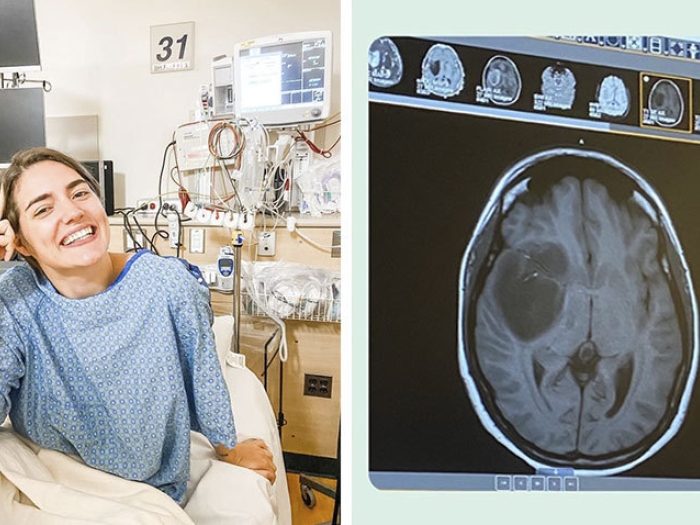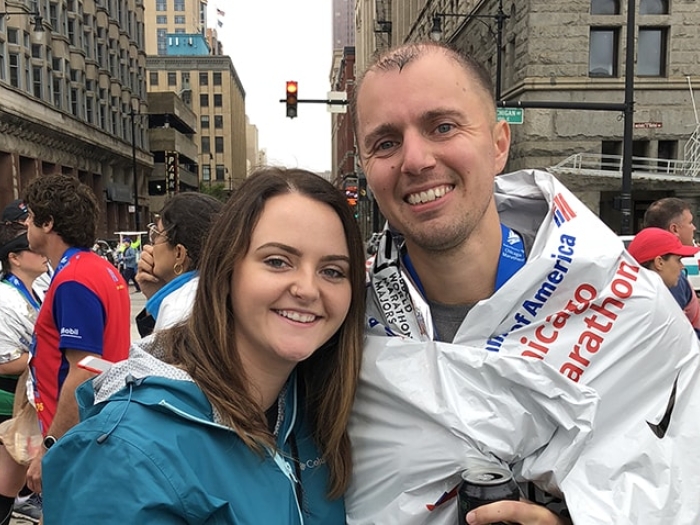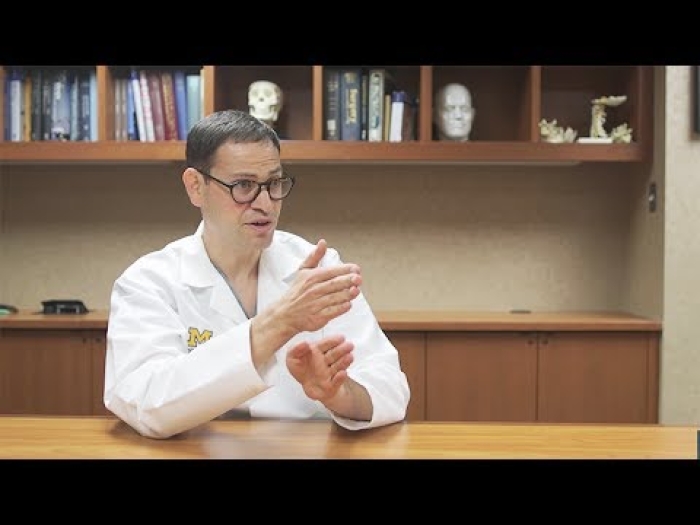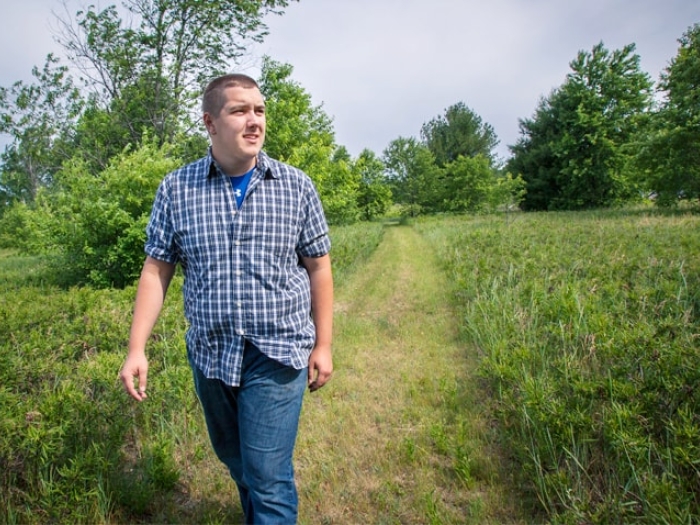One young woman’s rare brain tumor is responding to a new therapy in clinical trials for pediatric and adult patients.
10:45 AM
Author |
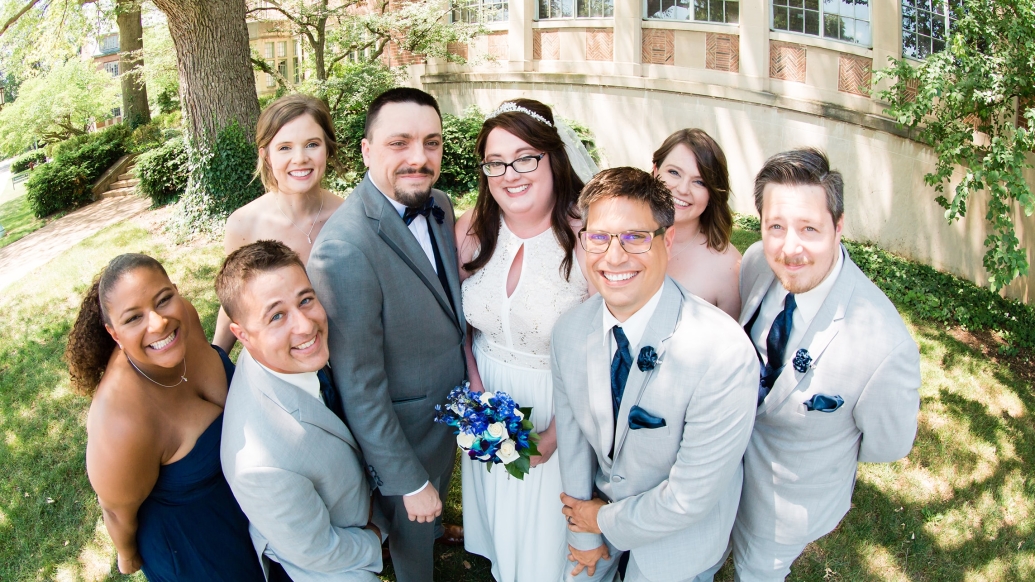
Caitlin Boyle Wetzel's wedding last June to her husband Richard was a storybook affair.
What made theirs different from the wedding they originally imagined were two doctors on the guest list: Wetzel's radiation-oncologist Michelle Kim, M.D., and neuro-oncologist Yoshie Umemura, M.D.
LISTEN UP: Add the new Michigan Medicine News Break to your Alexa-enabled device, or subscribe to our daily audio updates on iTunes, Google Play and Stitcher.
The couple met the physicians just a few months earlier, after Wetzel was diagnosed with a rare, inoperable brain tumor.
Today, the 27-year-old new bride is finding hope in a new treatment that is currently in clinical trials.
More than a migraine
Wetzel had suffered with migraine headaches for as long as she could remember. When the Stockbridge, Michigan, resident experienced one of her most severe headaches just over a year ago, she wasn't alarmed.
MORE FROM MICHIGAN: Sign up for our weekly newsletter
But when the pain hadn't subsided days later, the veterinary assistant went to the emergency department of her local hospital. There, an MRI revealed a mass around her brainstem and thalamus (critical regulatory centers of the brain).
Wetzel was transferred to Michigan Medicine, where she underwent more testing that showed her tumor was blocking the flow of spinal fluid through the ventricles, causing hydrocephalus.
Hydrocephalus is a condition in which too much cerebrospinal fluid (CSF) builds up within the brain ventricles. Among other things, the condition can cause headaches, blurred vision and nausea — all symptoms Wetzel was experiencing.
To relieve the pressure and fluid buildup caused by hydrocephalus, Michigan Medicine neurosurgeon Stephen Sullivan, M.D., inserted a drainage system, or shunt, to create a new pathway for the fluid to drain.
The shunt consists of a long, flexible tube placed in a ventricle of Wetzel's brain and tunneled under the skin to her abdomen, where the body naturally absorbs the fluid. The surgery also involved a biopsy of the tumor.
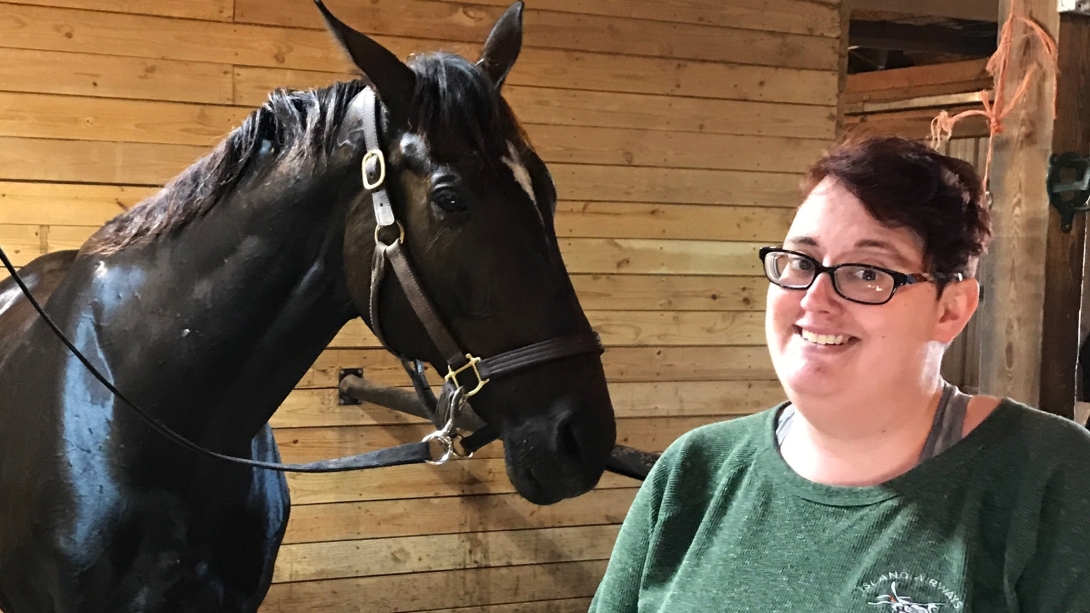
A devastating diagnosis
"Two weeks later came the result of the biopsy," recalls Wetzel. "I had a malignant brain tumor — known as H3K27M-mutant diffuse midline glioma. It was inoperable because of the location near my brainstem."
"Diffuse midline glioma, H3K27M-mutant, WHO grade 4, is an extremely rare tumor with no known cure," says radiation-oncologist Kim. "Surgical resection is usually not possible, and the mainstay of treatment has historically been radiation therapy."
Wetzel shared the devastating news with her family, who flew from Beaver Island, Michigan, a small island in Lake Michigan where she had grown up. Wetzel had been one of only five students in her high school graduating class.
SEE ALSO: Pilot and Marathoner Accelerates Life After Brain Tumor Surgery
Together, her close-knit family kept an optimistic outlook, gathering as much information as possible about the condition and available treatment options.
Her decision: a six-week combination of radiation, chemotherapy and steroids that began last February. Despite the aggressive therapy, however, her tumor continued to grow rapidly.
'Glimmers of promise'
After looking into novel treatment options based on the tumor's genetic mutations, Wetzel's Michigan Medicine care team suggested ONC201, an emerging new drug. ONC201 acts by blocking the molecular pathways that drive cancer cell growth.
The drug is currently in clinical trials for pediatric and adult patients and is showing "glimmers of promise," says neuro-oncologist Umemura.
Wetzel was not able to enroll in any existing ONC201 clinical trials, but with special permission granted by drugmaker Oncoceutics and the FDA, as well as approval by Michigan Medicine's Institutional Review Board, she would become the first adult brain cancer patient at Michigan Medicine to receive ONC201.
"Instead of traditional chemotherapy, the patient has been receiving ONC201 — an oral drug taken once a week — for a few months now, and her tumor has stopped growing," says Kim.
When you meet people like her, it reminds you of why you even became a doctor to begin with, and what an honor and privilege it is to share the journey with them.Michelle Kim, M.D.
Holding steady
Kim and Umemura are inspired by Wetzel's acceptance of her condition and her desire to help others with similar diagnoses.
"Caitlin is a very special individual," says Kim, noting that she was more concerned about helping other brain tumor patients, even while undergoing radiation and chemo treatment for her own tumor. "She truly views herself as a 'voice' for others."
Wetzel's attitude and outlook remain positive.
"I'm currently in a holding pattern and have an MRI every nine weeks. It's an aggressive tumor, so no growth is good news," she says, noting that the tumor likely began to grow a year ago when she experienced the severe headache.
"Holding steady is a good thing for this type of tumor," says Umemura. "We could hope for shrinkage of the tumor — it's not out of the question. There have been reported cases of patients with slow tumor shrinkage with ONC201."
Wetzel's latest MRI, conducted in early November, indicated that the tumor is stable.
Living her life
Wetzel is quick to point out that she hasn't let her tumor change any future plans — an outlook her new husband shares.
"Richard proposed while I was in the hospital," she says. "He knelt on the floor near my hospital bed and I didn't even realize he was proposing."
Wetzel said "yes" and the two were married a few months later.
The cancer has taught the newlyweds and their families a valuable lesson: Don't sweat the small stuff.
"We don't stress out about every little thing," says Wetzel, who is happy to be living in the country with two dogs, her husband and plenty of wide-open space.
"Caitlin's tumor remains stable and her attitude is good," says Umemura. "This tumor hasn't stopped her from living her life."
Kim agrees: "When you meet people like her, it reminds you of why you even became a doctor to begin with, and what an honor and privilege it is to share the journey with them."

Explore a variety of health care news & stories by visiting the Health Lab home page for more articles.

Department of Communication at Michigan Medicine
Want top health & research news weekly? Sign up for Health Lab’s newsletters today!
